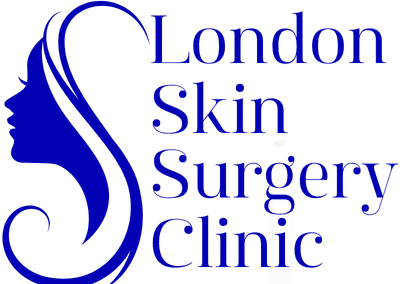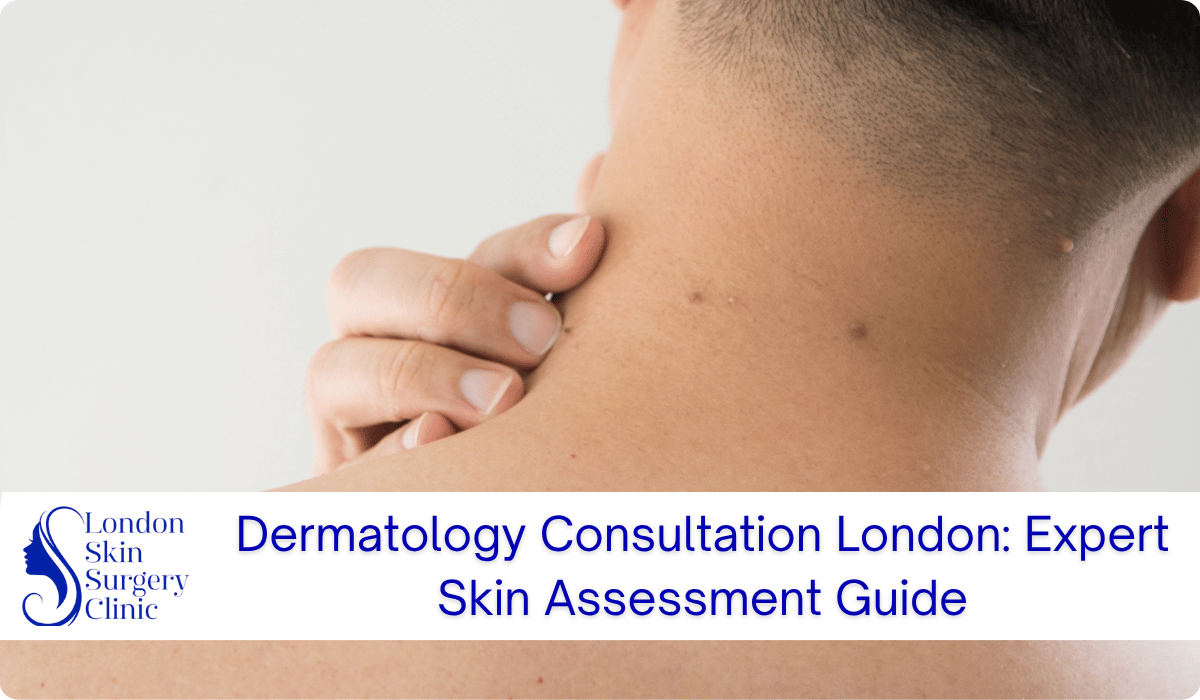Your London Dermatology Visit
- Initial dermatology consultations in London typically last 20-30 minutes and include a comprehensive review of your medical history, detailed skin examination, and discussion of treatment options.
- When selecting a dermatologist, verify their GMC registration, consider their specialization, clinic location, and patient reviews to ensure the best match for your specific skin concerns.
- Prepare for your appointment by documenting your symptoms, bringing a list of current medications and skincare products, and arriving with clean skin free from makeup or heavy moisturizers.
- Consultation costs range from £200-£350 for initial appointments, with additional charges for procedures like biopsies (£250-£450) or digital mole mapping (£300-£500).
- Book a skin evaluation promptly for changing moles, persistent skin conditions unresponsive to over-the-counter treatments, unusual hair loss, or if you have a family history of skin cancer.
- Follow-up care is tailored to your condition, with review appointments scheduled at appropriate intervals to monitor progress and adjust treatment plans as needed.
Table of Contents
- What to Expect During a Dermatology Consultation in London
- Finding the Right Dermatologist for Your Skin Assessment
- Common Skin Conditions Diagnosed During Consultations
- Preparing for Your First Dermatology Appointment
- Comprehensive Skin Examinations and Mole Check Procedures
- Understanding Dermatology Consultation Costs in London
- When Should You Book a Skin Health Evaluation?
- Follow-Up Care and Treatment Plans After Your Assessment
What to Expect During a Dermatology Consultation in London
A dermatology consultation in London typically begins with a warm welcome at a specialist clinic, where your medical history will be thoroughly reviewed. During this initial assessment, your dermatologist will ask detailed questions about your skin concerns, family history of skin conditions, and any previous treatments you’ve tried. This comprehensive approach ensures that your skin specialist gains a complete understanding of your unique situation.
The consultation will include a thorough examination of your skin, with particular attention to any areas of concern you’ve highlighted. London dermatologists use specialised equipment such as dermoscopes (magnifying devices with polarised light) to examine skin lesions in detail. This allows for accurate assessment of moles, pigmentation issues, and other skin abnormalities.
Following the examination, your dermatologist will discuss their findings with you, explaining any diagnosed conditions in clear, accessible language. They’ll outline potential treatment options, expected outcomes, and answer any questions you might have. Most dermatology consultations in London last between 20-30 minutes, providing ample time for a thorough assessment and discussion of next steps for your skin health journey.
Finding the Right Dermatologist for Your Skin Assessment
Selecting the ideal dermatologist for your skin assessment in London requires careful consideration of several key factors. First, verify the specialist’s credentials and ensure they are registered with the General Medical Council (GMC) and ideally a member of the British Association of Dermatologists. Specialists with additional qualifications in dermatological surgery or cosmetic dermatology may be particularly suitable depending on your specific concerns.
Location and accessibility are practical considerations when choosing a dermatologist in London. Many prestigious practices are located in Harley Street and surrounding medical districts, but excellent dermatologists can be found throughout the city. Consider how easily you can reach the clinic for both initial consultations and any follow-up appointments that may be required.
Patient reviews and testimonials provide valuable insights into the dermatologist’s approach and bedside manner. Look for specialists who take time to listen, explain conditions clearly, and develop personalised treatment plans. Many London dermatology clinics showcase patient experiences on their websites or independent review platforms.
Finally, consider the range of services offered by the dermatology clinic. A comprehensive practice like Skin Surgery Clinic London will offer everything from routine skin assessments to advanced treatments, ensuring continuity of care regardless of your diagnosis. Some clinics also offer specialised services such as paediatric dermatology, skin cancer screening, or aesthetic procedures, which may be relevant to your specific needs.
Common Skin Conditions Diagnosed During Consultations
Dermatology consultations in London frequently identify a range of common skin conditions that affect patients of all ages. Acne remains one of the most prevalent concerns, with dermatologists assessing severity and recommending appropriate treatments from topical preparations to oral medications like antibiotics or isotretinoin for severe cases. Eczema and dermatitis are also routinely diagnosed, with specialists distinguishing between atopic, contact, and seborrhoeic forms to provide targeted management strategies.
Skin cancer screening forms a crucial part of many consultations, with dermatologists examining suspicious moles and lesions for signs of melanoma, basal cell carcinoma, and squamous cell carcinoma. Early detection through expert assessment significantly improves treatment outcomes for these conditions. Psoriasis, characterised by red, scaly patches, is another condition frequently identified during skin assessments, with London dermatologists offering treatments ranging from topical therapies to phototherapy and systemic medications.
Rosacea, fungal infections, and hair loss concerns including alopecia areata and androgenetic alopecia are regularly diagnosed during consultations. Specialists also identify less common conditions such as lichen planus, vitiligo, and hidradenitis suppurativa, which benefit from expert management. London dermatologists are particularly skilled at recognising skin manifestations of systemic diseases, ensuring patients receive comprehensive care that addresses both dermatological symptoms and potential underlying health issues.
Preparing for Your First Dermatology Appointment
Maximising the value of your dermatology consultation in London begins with thorough preparation. Start by compiling a comprehensive list of all medications, supplements, and skincare products you currently use, including precise names and dosages. This information helps your dermatologist identify potential triggers or interactions affecting your skin condition. If you’ve previously been diagnosed with skin issues, gather any relevant medical records, including previous treatment plans and their outcomes.
Consider documenting your skin concerns with photographs, particularly if your symptoms fluctuate or appear intermittently. This visual history can be invaluable for your dermatologist, especially if your condition isn’t visible during your appointment. Prepare a timeline of your symptoms, noting when they first appeared, any patterns you’ve observed, and factors that seem to improve or worsen your condition.
On the day of your skin assessment appointment, arrive with clean skin free from makeup, heavy moisturisers, or other products that might obscure your natural skin condition. Wear clothing that allows easy examination of affected areas while maintaining your comfort. If your concern involves your scalp, consider washing your hair the day before rather than immediately before the appointment.
Finally, prepare a list of specific questions you wish to ask during your consultation. Common queries include treatment options, expected outcomes, potential side effects, lifestyle modifications, and follow-up care requirements. This preparation ensures you leave your appointment with a clear understanding of your skin condition and management plan.
Comprehensive Skin Examinations and Mole Check Procedures
Comprehensive skin examinations in London dermatology clinics involve systematic assessment of your entire skin surface to identify any abnormalities or concerning lesions. During a full-body skin check, you’ll be provided with appropriate gowning to maintain dignity while allowing thorough examination. The dermatologist will methodically inspect your skin from scalp to soles, including often-overlooked areas such as between toes, behind ears, and the genital region when necessary and appropriate.
Mole check procedures employ advanced diagnostic techniques to evaluate pigmented lesions. Dermoscopy is standard practice in London clinics, using a handheld device that combines magnification with polarised light to visualise structures beneath the skin surface invisible to the naked eye. This non-invasive technique significantly improves diagnostic accuracy for melanoma and other skin cancers. Some specialist clinics offer digital dermoscopy and mole mapping, creating a photographic record of your moles that serves as a baseline for future comparisons.
During skin cancer screening, dermatologists assess moles using the ABCDE criteria: Asymmetry, Border irregularity, Colour variation, Diameter greater than 6mm, and Evolution or change over time. Any suspicious lesions may be photographed, measured, and documented in your medical record. If a concerning lesion is identified, your dermatologist will discuss the need for a skin biopsy, which can often be performed during the same appointment using local anaesthetic.
Beyond mole checks, comprehensive skin examinations evaluate overall skin health, identifying conditions such as eczema, psoriasis, or fungal infections that may require treatment. The dermatologist will also assess your skin type and sun damage level, providing personalised advice on skin protection and cancer prevention strategies.
Understanding Dermatology Consultation Costs in London
Dermatology consultation costs in London vary considerably depending on several factors, including the specialist’s experience, clinic location, and consultation type. Initial consultations with consultant dermatologists typically range from £200 to £350, with Harley Street and central London practices generally commanding premium rates. Follow-up appointments are usually priced lower, averaging between £150 and £250. These fees reflect the specialist expertise and comprehensive assessment provided during your skin health evaluation.
Additional diagnostic procedures may incur separate charges beyond the basic consultation fee. Skin biopsies typically cost between £250 and £450, including the procedure and pathology analysis. Digital mole mapping services, offering comprehensive photographic documentation of all your moles for future comparison, range from £300 to £500 depending on the technology used and body areas covered.
Many London dermatology clinics offer package deals for specific services. For example, a comprehensive skin cancer screening package might include the initial consultation, full-body examination, dermoscopy of suspicious lesions, and a written report for a combined fee. Similarly, acne assessment and treatment packages might bundle the consultation with initial treatments and follow-up care.
While private health insurance may cover dermatology consultations for medical conditions, cosmetic concerns typically require self-funding. It’s advisable to check with your insurance provider before booking your appointment to understand coverage limitations. Most London dermatology clinics accept major credit cards, and some offer payment plans for more extensive treatment courses. Always confirm the full cost structure before your appointment to avoid unexpected charges.
When Should You Book a Skin Health Evaluation?
Knowing when to schedule a dermatology consultation in London is crucial for maintaining optimal skin health. Certain symptoms warrant prompt attention from a skin specialist. Any new mole or existing mole that changes in size, shape, colour, or begins to bleed or itch should be evaluated without delay. These changes could indicate melanoma or other skin cancers, where early detection significantly improves treatment outcomes.
Persistent skin conditions that haven’t responded to over-the-counter treatments after 2-3 weeks justify professional assessment. This includes stubborn acne, rashes, excessive dryness, or unusual patches of skin discolouration. Severe or rapidly spreading rashes, especially when accompanied by fever or pain, require urgent dermatological evaluation as they may indicate serious conditions like cellulitis or allergic reactions.
Consider booking a skin health evaluation if you notice unusual hair loss, nail changes, or persistent scalp issues. These symptoms can indicate underlying health conditions that benefit from early intervention. Individuals with a personal or family history of skin cancer should schedule regular preventative screenings, typically annually, though your dermatologist may recommend more frequent checks based on your risk profile.
Lifestyle transitions also present appropriate times for dermatology consultations. Before significant sun exposure (such as relocating to a sunnier climate or planning a tropical holiday), pregnant women experiencing skin changes, and adolescents developing severe acne can all benefit from specialist advice. Additionally, adults over 40 should consider a baseline skin assessment even without specific concerns, as age-related skin conditions become more common and preventative strategies can be implemented.
Follow-Up Care and Treatment Plans After Your Assessment
Following your dermatology consultation in London, you’ll receive a personalised treatment plan tailored to your specific skin condition and health needs. This comprehensive plan typically outlines medication prescriptions, topical treatments, and recommended skincare routines. Your dermatologist will explain each element of the plan, including proper application techniques, frequency of use, and expected timeframes for improvement. For complex conditions, written instructions may be provided to ensure you can follow the regimen correctly at home.
Follow-up appointments are a crucial component of dermatological care, allowing your specialist to monitor progress and adjust treatments as necessary. The timing of these appointments varies based on your condition—acute issues might require review within 2-4 weeks, while chronic conditions may be monitored every 3-6 months. During these follow-up consultations, your dermatologist will assess treatment efficacy, address any side effects, and potentially modify your regimen based on your skin’s response.
For conditions requiring procedural interventions, such as mole removal, cryotherapy, or laser treatments, your follow-up care will include specific wound care instructions and scar management strategies. Pathology results from any biopsies will be discussed during these appointments, with clear explanations of findings and implications for your ongoing care. London dermatology clinics often provide dedicated contact channels for patients to raise concerns between scheduled appointments.
Long-term management strategies form an essential part of follow-up care, particularly for chronic conditions like psoriasis, eczema, or rosacea. These strategies may include lifestyle modifications, trigger avoidance, stress management techniques, and dietary considerations. Your dermatologist will work collaboratively with you to develop sustainable approaches that fit your lifestyle while effectively managing your skin condition. For complex cases, they may coordinate with other specialists, such as allergists, rheumatologists, or nutritionists, ensuring holistic care for conditions with systemic implications.
Frequently Asked Questions
How long does a dermatology consultation in London typically last?
Most dermatology consultations in London last between 20-30 minutes. Initial consultations may be longer (up to 45 minutes) to allow time for comprehensive medical history taking and thorough skin examination. Follow-up appointments are usually shorter, typically 15-20 minutes, focusing on treatment progress and adjustments.
What is the average cost of a dermatologist appointment in London?
Initial dermatology consultations in London typically range from £200 to £350, depending on the specialist’s experience and clinic location. Harley Street and central London practices generally charge premium rates. Follow-up appointments are usually less expensive, averaging between £150 and £250. Additional procedures like biopsies (£250-£450) or mole mapping (£300-£500) incur separate charges.
How do I know if I need to see a dermatologist for a skin issue?
You should consult a dermatologist if you notice: changes in existing moles (size, shape, color); skin lesions that bleed, itch or don’t heal; persistent rashes or skin conditions that haven’t improved with over-the-counter treatments after 2-3 weeks; severe acne unresponsive to standard treatments; unexplained hair loss; or if you have a family history of skin cancer and need screening. Any rapidly spreading rash, especially with fever, requires urgent evaluation.
What should I avoid before a dermatology appointment?
Before your dermatology appointment, avoid wearing makeup, heavy moisturizers, or other skincare products that might mask your natural skin condition. Don’t exfoliate or use retinoids 2-3 days before your visit to prevent temporary skin irritation. Avoid excessive sun exposure or tanning for at least one week prior. If possible, don’t take non-essential medications that could affect your skin (like NSAIDs) without consulting your doctor first.
How often should I get a mole check in London?
For individuals with no personal or family history of skin cancer and few moles, an annual mole check is generally sufficient. Those with multiple moles, atypical moles, personal or family history of skin cancer, or previous significant sun exposure should consider screenings every 6-12 months. Your dermatologist will recommend a personalized screening schedule based on your specific risk factors during your initial consultation.
Can I get a same-day dermatology appointment in London?
Same-day dermatology appointments in London are possible but not guaranteed. Many private clinics reserve slots for urgent cases and may accommodate emergency situations like rapidly spreading rashes or concerning skin changes. For the best chance of securing a same-day appointment, call clinics early in the morning and explain the urgent nature of your condition. Some dermatology practices also offer virtual consultations that can often be arranged more quickly than in-person visits.
Will my private health insurance cover my dermatology consultation in London?
Most private health insurance policies cover dermatology consultations for medical conditions, but coverage varies significantly between providers and plans. Cosmetic concerns are typically excluded from coverage. Before booking, verify with your insurance provider whether they cover dermatology services, if you need a GP referral first, which clinics are in-network, and any limits on consultation fees. Many London dermatology clinics can provide the necessary billing codes to check coverage with your insurer.


